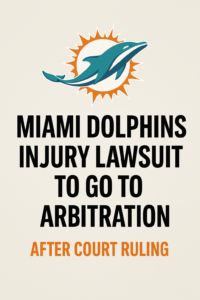
Florida Appeals Court Rules in Favor of Hard Rock Stadium and Miami Dolphins football team
The Miami Dolphins injury Lawsuit and Hard Rock Stadium will resolve a fan’s personal injury lawsuit through arbitration, following a significant ruling by Florida’s Third District Court of Appeal. The ruling overturned a lower court’s rejection and affirmed the validity of arbitration clauses tied to ticket agreements.
The Fan After Miami Dolphins Injury Lawsuit
Cameron Engwiller sued the Miami Dolphins and South Florida Stadium, LLC, claiming she was injured on October 23, 2022, during a fight that broke out between other fans at Hard Rock Stadium. Engwiller attended the Pittsburgh Steelers vs. Miami Dolphins game with her boyfriend and mother, using digital tickets. The tickets were provided to her mom by her mother’s employer, Southeast Toyota Distributors, which has been identified by people to be in Deerfield Beach.
Miami Dolphins injury Lawsuit Relies on Ticket Terms
The Dolphins and the stadium operator claimed that Engwiller was subject to an arbitration clause included in the digital ticket agreement.
These terms were accessible via a hyperlink when her mother, Lori Engwiller, accepted the tickets online five days before the game. A notice on the website clearly stated that by continuing, users agreed to all policies, including mandatory arbitration.
Appeals Court Overrules Trial Judge on Arbitration
Miami-Dade County Judge Spencer Eig had initially rejected the motion to compel arbitration, citing that Cameron was not legally bound by her mother’s actions. However, the appellate court disagreed, stating that Lori effectively acted as her daughter’s agent by securing and presenting the ticket on her behalf.
Writing for the three-judge panel, Judge Bronwyn Miller emphasized that arbitration agreements streamline dispute resolution and that allowing a fan to benefit from a ticket without honoring its conditions would undermine public policy and create industry-wide challenges.
Details of the Injury Incident at Hard Rock Stadium
According to the lawsuit, Engwiller, 21 at the time, was leaving the Southeast Toyota Suite when she encountered a group of intoxicated and hostile individuals. She claims she was struck in the face, thrown into a wall, and slammed onto her back, suffering serious injuries. Her attorney, Lee Friedland, alleged that the Dolphins and stadium failed to provide proper supervision in the area.
The defendants deny any wrongdoing and assert that the case must be resolved privately, as agreed in the ticket’s arbitration terms.
Court Cites Precedent in Ticket Arbitration Enforcement
Judge Miller referred to a similar case—Jackson v. WWE (2024)—where the U.S. Court of Appeals for the Fifth Circuit ruled in favor of arbitration after a ticket was presented by a third party. The court concluded that if someone allows another person to use a ticket on their behalf, they are also bound by the ticket’s conditions.
The panel also noted that the arbitration terms were clearly visible, with bold formatting and placement designed to draw attention, meeting legal standards for sufficient notice.
Why This Decision Matters for Sports and Event Ticketing
This ruling could have major implications for how arbitration clauses are enforced in ticketing, particularly in cases where family or friends transfer digital tickets. The court warned that allowing spectators to sidestep these agreements simply because they didn’t personally access the ticket would create confusion and legal gray areas for teams, venues, and ticket platforms.
Arbitration Clauses in Sports Tickets Remain a Legal Gray Area
This case adds to a growing body of legal decisions on arbitration in sports ticketing. Courts have reached different conclusions depending on how terms are presented. When terms are hard to find or read—such as hidden links, small fonts, or unclear language—courts may refuse to enforce them. In this case, however, the appellate court found the arbitration clause clear and enforceable.
